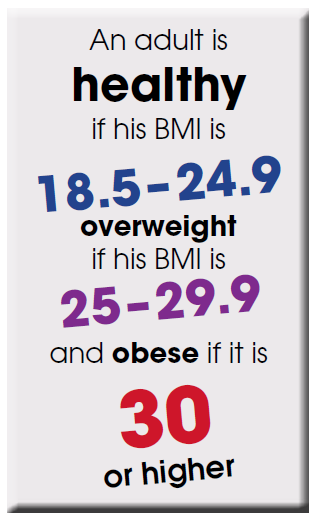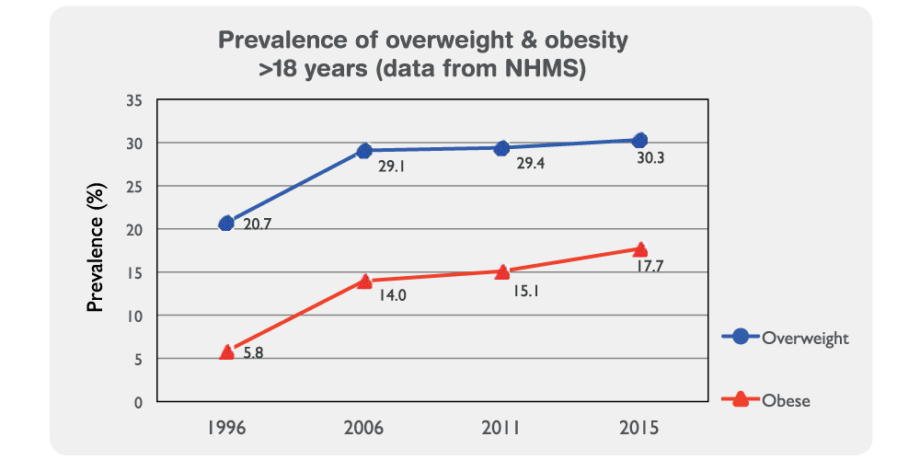Malaysia made unglamorous headlines after being ranked as the most obese country in Southeast Asia. This was according to the 2017 ‘Tackling Obesity in ASEAN’ report by the Economist Intelligence Unit, which covered Malaysia, Singapore, Indonesia, Thailand, Vietnam, and the Philippines. This is a wake-up call for Malaysians to realise that overweight and obesity are serious issues that can no longer be ignored.
People need to accept the fact that overweight and obesity have detrimental effects to our health and well-being. Overweight and obesity can lead to an endless list of critical diseases and complications, especially non-communicable diseases (NCDs) like diabetes, cancers and heart diseases. Apart from our body, our mental wellbeing is also impacted by this problem. If this trend continues, our country may face an increase in medical expenses and a decrease in work productivity.
Overweight and obesity are weight problems that result from excessive fat deposition in our body. A way to recognise and monitor this problem is by measuring our body mass index (BMI). It is vital to be conscious of our health, starting from conception and early ages.
Monitoring overweight and obesity
Obesity and overweight are medical conditions where there is an accumulation of excessive body fat which impairs health. Basically, this is when a person’s weight is greater than what is considered as healthy for his height. As it is difficult to determine an accurate body fat percentage easily, the body mass index (BMI), a simple weight-for-height index, is often used to estimate and classify obesity and overweight in adults and children.
However, appraising a child’s BMI is a little different than adults. As children’s growth rate varies with age, BMI-for-age growth charts are used to determine the growth achievement of children based on a growth standard. The chart can be downloaded from Positive Parenting website at https://mypositiveparenting. org/. When assessing your child’s BMI-for-age status, use the correct chart for your child’s age and gender. Monitoring your child’s BMI regularly is important to ensure his growth and development is on the right track and it will help you to recognise the first signs of overweight.
Obesity is a complex condition caused by a variety of interlinked factors. Parents need to be aware of the dangers of obesity and not perceive child fatness as something normal or harmless. Numerous studies have shown that obese children are more likely to become obese adults, hence increasing their risk of being afflicted with NCDs in the future. However, remember that prevention of obesity is possible.
Danger in the number
Obesity is on the rise around the world and in Malaysia. The World Health Organization (WHO) estimated that worldwide obesity has nearly tripled since 1975. According to Dr Tee E Siong, President of Nutrition Society Malaysia, nationwide surveys in Malaysia are showing increasing trends of obesity prevalence among adults and children. The results of three surveys among school children in the country have reported a high prevalence of about 30% are affected by overweight and obesity problems (see table below).
Among adults, according to the National Health and Morbidity Survey (NHMS), there has been a steady increase in obesity and overweight prevalence in Malaysia. The NHMS data indicated the problems rose rapidly in the late 1990s. From 1996 to 2015, there has been a 1.5 times increase in overweight and a more worrying 3-fold increase in obesity. “The numbers are now at worrying levels wherein almost every other adult in Malaysia (47.7%) is either overweight or obese,” highlighted Dr Tee. This trend will gradually lead to a surge of NCDs like diabetes and heart diseases in the Malaysian population if no serious steps are taken to deal with the problem. “The number shows that there is still a lack of awareness in our society about the dangers of obesity. It is even more necessary today to educate society on early preventative measures to deal with the root of the problem, so that the trend can be controlled,” he added.
Root of the problem
Obesity is rooted in a number of risk factors. An unhealthy diet is a main contributor to the increase of obesity in Malaysia. “The richness of Malaysian food culture is something that everyone is proud of, but it might also be one of the reasons leading to our infamous rank in obesity in Southeast Asia if we do not eat judiciously,” said Dr Tee. He pointed out that excessive consumption of meals and beverages that are high in calories, sugar, salt, and oil, frequent late night suppers, eating too much dessert when hanging out with friends, or snacking on foods of poor nutritional value between mealtimes are just some examples of bad eating habits contributing to obesity. The lack of physical activity and exercise is another key contributory factor. Children are spending less time playing outside, as more time is spent on sedentary activities like watching TV, playing video games, and browsing social media. Unhealthy diets and physical inactivity will lead to extra calories and excess weight.
Apart from that, family factors can also contribute to obesity. Genetic disposition and having family members with weight problems increase the possibility of a child to become overweight. Shared family behaviours such as eating and physical activity habits also have a role in this problem. Likewise, psychological factors such as stress, anxiety, or depression due to personal problems may cause children as well as adults to overeat or binge on unhealthy foods, thus increasing obesity risk. Meanwhile, although socioeconomic factors may not be as noticeable as others, but obesity prevalence among certain demographics may be attributed to factors such as limited resources and access to healthy foods and the lack of time and safe space for physical activities.
A threat to health
The combination of these risk factors results in overweight and obesity, causing various complications and consequences on an individual. According to Datuk Dr Zulkifli Ismail, Secretary-General of Asia Pacific Paediatric Association, obesity is one of the main metabolic risk factors for NCDs (e.g. diabetes, cancers, cardiovascular diseases). An obese child is more likely to have high blood pressure and cholesterol level, which can lead to stroke and other cardiovascular diseases in the future. Obesity also increases the risk of impaired glucose tolerance, insulin resistance and type 2 diabetes. Other health complications can also arise, such as breathing problems (e.g. asthma and sleep apnoea), and musculoskeletal problems like osteoarthritis.
The statistics on NCDs and related risk factors are already showing the impact of these weight problems. The NHMS data showed an alarming doubling in the prevalence of diabetes increasing from 8.3% (1996) to 17.5% (2015). NHMS numbers also show more than two times increase of high blood cholesterol problem, from 20.7% (2006) to 47.7% (2015). Meanwhile, hypertension prevalence stays high at around 30% during the same time period. Risk factors of NCDs such as hypertension, high blood sugar, and high blood cholesterol are closely linked to overweight and obesity, and all these will definitely increase the number of NCDs patients, causing a devastating impact on our society.
“Obesity can also have various psychological and social effects, especially in a child, whose mental state is more vulnerable,” said Datuk Dr Zulkifli. Being obese can cause a child to have a low self-esteem, negative body image, anxiety, and depression. Obese children may also have problems at school and with their peers. They may get teased and bullied for their size, have poor academic performance and social skills, and get tired easily in class.
Prevention starts early
Knowing that obesity can cause these negative lasting effects in life, it is even more essential to take early measures in preventing obesity. As the saying goes, “Prevention is better than cure”, and in this case, obesity prevention should start as early as mother’s pregnancy and continue to early childhood. The whole family plays an important role in setting healthy habits and a home environment conducive to ensure the development of a healthy child.
How can obesity be prevented from the beginning of mother’s pregnancy? Dr H Krishna Kumar, Past President of Obstetrical and Gynaecological Society of Malaysia, said that this relates to how mother’s habits during pregnancy can have an impact on her baby’s weight at birth, and the baby’s risk of becoming obese. Independent of a mother’s genes and pre-pregnancy weight, excessive weight gain during pregnancy can lead to a baby’s heavier birth weight, which in turn will increase the baby’s chances of becoming overweight or obese during childhood. “Moms always have this perception that she has to eat for two – herself and baby. It is true that getting enough nutrients is important for the health of both mom and baby, but that is not a reason to overeat by eating for two. In fact, you should be keeping a closer watch of what you eat and have healthier meals,” explained Dr Krishna.
On another note, women with obesity or a family history of diabetes may develop gestational diabetes, a condition of high blood sugar during pregnancy that disappears after giving birth. Some studies have suggested that their babies may be more likely to become obese and develop diabetes or other NCDs in the future. Thus, obese women should reduce their weight before trying to conceive, as a step to prevent gestational diabetes.
Recommended weight gain for pregnant mothers
Pregnant women with different pre-pregnancy BMI have a different limit of gestational weight gain. The recommended weight gain is as follows:
More studies are finding links between the condition of pregnancy and early childhood, and how it can affect a child’s susceptibility to NCDs and other health problems. Studies in this area can be categorised under a new field of medicine known as the Developmental Origins of Health and Disease (DOHaD). DOHaD focuses on how the environment during early human development, including interactions between environmental and genetic factors, can influence health and risk of disease in later life. For humans, the first 1000 days of a child’s life is a critical period of mental development and physical growth. In DOHaD’s term, the 1000-day period begins at the moment of conception (Day 0), lasts through the whole pregnancy (Day 270), and up to the child’s second birthday (Day 1000).
Dr Tee stressed, “During this 1000-day period, it is crucial to provide adequate and proper nutrients to ensure the child’s future health and wellbeing.” Other than ensuring healthy eating habits for pregnant women, it is also vital to provide proper amounts of both macro- and micro-nutrients to infants below two years. Babies should be exclusively breastfed from birth up to six months of age, and a lactating mother has to watch her diet so that it contains the necessary nutrients to ensure a healthy production of quality breast milk. Adequate nutrition continues to play a critical role when entering the complementary feeding phase, when the baby is six months-old. From the age of 1-2 years, parents should continue to give close attention to ensure the toddler meets his nutritionals needs.
Poor dietary practices during the first 1000 days could result in malnutrition: under-nutrition or over-nutrition. Under-nourished children are more susceptible to chronic diseases, have poor growth and development, and have hampered behavioural and cognitive development, which can lead to learning complications in the future. On the other hand, over-nourished children will become overweight and obese, increasing their risk of growing up to become overweight and obese adults. Consequently, this will increase their risk of developing diabetes, cancers, and heart disease.
Holistic approach to prevention
Obesity prevention has to start by educating and raising the awareness among parents. Nutrition plays an important role in the prevention of obesity. “Having a healthy and nutritious diet is one essential approach in tackling obesity,” emphasised Dr Tee. The general guideline to a healthy diet is to have meals with a good balance of foods from the main food groups with a variety of food items and consumed in moderate quantities. Reduce sugar, salt, oil and fat, and include more fruits and vegetables in meals. Do opt for whole grains whenever possible. It is very important for parents to be conscious of their family’s dietary intake to prevent weight problems. If you think that your child is overweight and you are not sure of what to do, the article on page 36 covers useful ways on how to start.
“The home environment and family habits are also essential elements in the prevention of obesity. The home is where children spend most of their early years of life, and the family has a huge influence on a child’s development,” explained Datuk Dr Zulkifli. For a healthy family, parents have to lead by example and practice healthy lifestyles themselves. Parental habits and behaviour will be followed by their child, as they are the child’s first teacher. For family meals, cook more at home with fresh and nutritious ingredients using healthier cooking methods like steaming.
Be mindful of children’s nutritional needs and intake when purchasing groceries. Consumption of fast food and less healthy snacks (with high fats, oils, sugar and salt) should be reduced to a minimum or avoided if possible.
Families should also spend more time doing physical activities together such as jogging, cycling, or hiking. Participation in sports like badminton or football is encouraged. Ensure at least 60 minutes of physical activities daily, which can be done in several sessions. Minimise sedentary activities such as watching TV and playing with gadgets. Also, practise good sleep hygiene by sleeping early and on time. Nurturing healthy habits in the family is crucial in preventing overweight and obesity. If you need ideas on how to get your family to be more physically active, read more about it on page 43.
There are plenty of other ways to be healthy as a family and to tackle obesity. Remember that the prevention of obesity should start from home and as early as possible. A healthy family begets a healthy child.
With Dr Tee E Siong, Nutritionist & President of Nutrition Society of Malaysia; Datuk Dr Zulkifli Ismail, Secretary-General of Asia Pacific Paediatric Association; Dr H Krishna Kumar, Consultant Obstetrician & Gynaecologist and Past President of Obstetrical and Gynaecological Society of Malaysia.





















Comments